What Is The Best Juice To Drink For Your Kidneys? - Renal Chronic Kidney Disease
Kidney disease can be a difficult thing to live with, but the right juices can help you manage your condition.
There are many different kinds of juices that are beneficial for those living with kidney disease, and in this article we'll explore what kinds of juices may be helpful and why.
We'll also look at some things to consider when selecting juices, such as the potential interaction between grapefruit juice (grapefruit and ckd) and statin medication.
As a Registered Dietitian with over 25 years of experience in renal nutrition, I provide evidence-based guidance to help individuals with Chronic Kidney Disease (CKD) make informed dietary choices. I stay up to date with the latest CKD research and guidelines to ensure that my recommendations, including selecting kidney-friendly juices, support optimal kidney health. Through my work, I have helped thousands of CKD patients navigate their diets, emphasizing the importance of choosing low-potassium, unsweetened beverages to maintain kidney function.
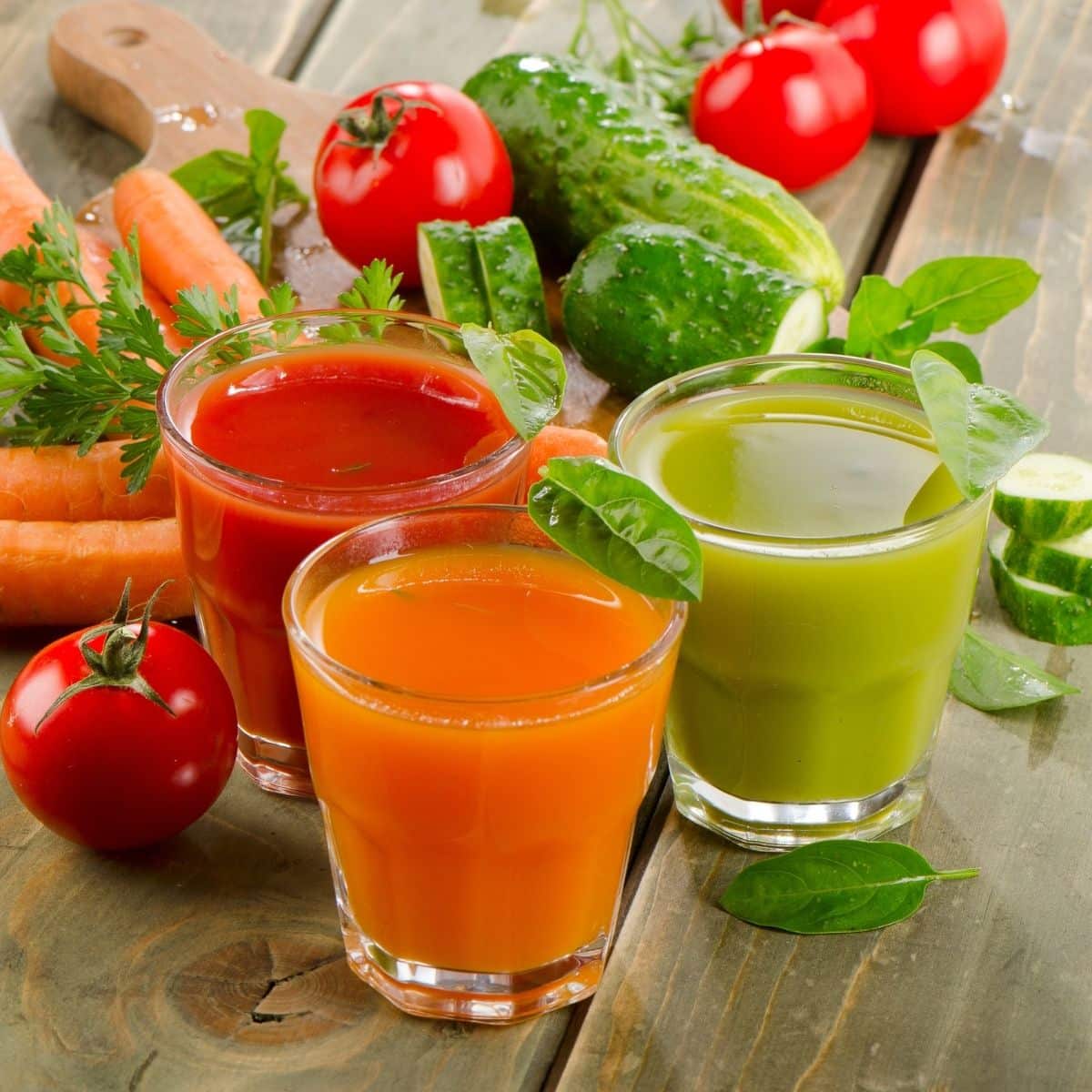
If you're living with kidney disease, read on to learn about which types of juice may be best for you!
Jump to:
- What Is The Best Juice For Your Kidneys?
- Water Is The Best Drink For CKD Patients
- Recommended Juices and Drinks
- Low Potassium Juices
- Vegetable Juices For People With CKD
- Is Carrot Juice Good For Kidneys?
- Green Juices and Smoothies
- Grapefruit and Statin Medication
- Unsweetened Cranberry Juice Benefits For Your Kidneys
- Lemon and Lime Juice
- FAQs for Best Juice for Kidney Disease
What Is The Best Juice For Your Kidneys?
In this overview, you'll get the scoop on which renal diet drinks are best for your health - and as they say, an ounce of prevention is worth a pound of cure. For those with kidney disease or at risk for developing it, it's important to be aware of how certain types of juices may affect your hydration levels and overall kidney health.
While there are risk factors that cannot be controlled, such as age or family history, diet and lifestyle changes can help alleviate the severity of symptoms associated with kidney disease.
It may be boring, sorry; however, water is easily the best beverage to drink if you have kidney disease. You should, in fact, it’s recommended to drink at least 8 glasses of it daily in early stages of kidney disease as long as your doctor or health care provider hasn’t told you to restrict fluids.
Staying hydrated with water helps kidney health. But what else can you drink? How about citrus juice or infused waters?
The cucumber water and fresh fruits at the spa always tastes refreshing and amazing. You can have black coffee, green tea, the occasional sparkling water or glass of red wine to reach your fluid intake.
When considering what type of juice to drink in order to maintain proper hydration levels and support healthier kidneys, look for unsweetened juices that don't contain added sugars.
Some juices like carrot juice, passion fruit juice, and pomegranate juice are typically high in potassium so should be avoided by patients with kidney disease since too much potassium can lead to heart problems.
On the other hand, cranberry juice is beneficial because it helps reduce inflammation in the urinary tract while also helping prevent urinary tract infections (UTIs).
Apple juice is also a good choice because its natural sugar content makes it easier for people with chronic kidney disease to digest compared to other beverages.
Keep in mind that while these juices may support better health outcomes for those with kidney issues, drinking any beverage excessively can lead to dehydration due to excessive urination caused by diuretics used in treating renal failure.
Therefore, speak with your doctor about how much fluid intake is safe when managing your particular condition before adding any new drinks into your diet.
For More Recipes and Ideas --->> Get Your Free Meals and Recipes That Are Perfect for Pre-Dialysis Diets, Pre-Dialysis with Diabetes, or Dialysis Diets.
Water Is The Best Drink For CKD Patients
Water is undoubtedly the best drink for your kidneys and managing kidney disease. It naturally supports kidney function by helping to flush out toxins and waste products from the body, maintaining essential hydration without adding any extra burden. Unlike juices or other beverages, water does not contain sugar, calories, or additives, which can be detrimental to kidney health.
Excessive sugar, often found in juices, can lead to higher blood sugar levels and potentially increase kidney damage, especially in people with diabetes, a common comorbidity with kidney disease. Water, being pure and simple, facilitates the kidneys' job of filtering blood and maintaining a balanced internal environment.
In contrast, while juices are often perceived as a healthy alternative, they may not be the best choice for those with kidney disease. Juices, particularly those that are commercially processed, are high in sugars and may contain additives and preservatives that can increase the workload on the kidneys.
Furthermore, some juices are high in potassium or phosphorus, which in excessive amounts can be harmful for those with kidney disease, as their kidneys struggle to regulate these minerals effectively. Therefore, for maintaining optimal kidney function and overall health, water remains the superior beverage choice, providing the hydration the kidneys need without any detrimental extras found in most juices.
Recommended Juices and Drinks
For those who wish to get creative in the kitchen, there are plenty of recipes available online specifically tailored towards individuals on a kidney diet, such as apple cranberry juice or carrot orange juice blends.
Juice blending is an excellent way of creating tasty and nutritious drinks that support the nutritional needs of those with kidney disease.
What produce to eat with CKD? Choosing fruits and vegetables, look for low-potassium ingredients, such as apples, cranberries, blackberries, peaches, and pineapple. Additionally, be sure to pay attention to juice safety by always washing produce thoroughly before juicing.
For added flavor and nutrition, try adding herbs like mint or ginger, as well as spices like cinnamon or nutmeg. It's important to keep in mind that many store-bought fruit juices contain high amounts of sugar, which should be avoided if you have kidney disease.
When considering any type of dietary change, it's best to consult your doctor first and then work together with a registered dietitian who can provide individualized meal plans suited for your specific needs.
With careful selection and mindful consumption of certain juices, it is possible to enjoy flavorful drinks while still supporting healthy kidneys!
Low Potassium Juices
Individuals with kidney disease need to be mindful of their dietary potassium intake as high levels of potassium can be harmful to their health.
When the kidneys are not functioning properly, they may not be able to remove excess potassium from the body, leading to a condition called hyperkalemia. Hyperkalemia can cause muscle weakness, irregular heartbeat, and other serious health problems.
Low potassium juices can be an excellent option for individuals with kidney disease as they provide hydration benefits and essential minerals without increasing blood potassium levels.
Some examples of low potassium juices include apple, cranberry, and grape juices. These juices can help keep electrolyte levels balanced and prevent dehydration during physical activity (exercise for healthy heart) or hot weather conditions.
With so many delicious options available, low potassium juices offer plenty of ways to keep your kidneys healthy while still enjoying your favorite drinks!
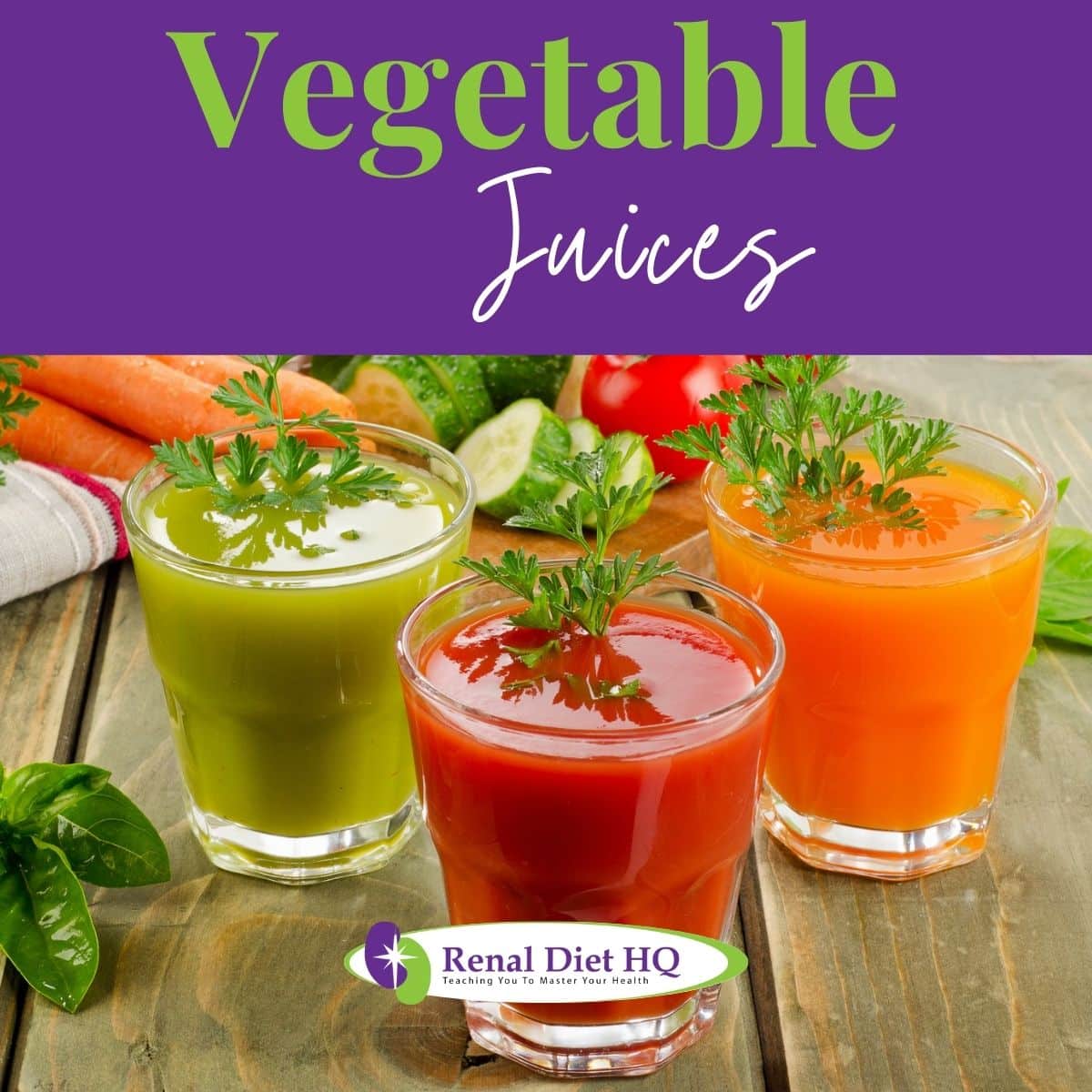
Vegetable Juices For People With CKD
Vegetable juices are packed with vita mins and minerals, making them a powerhouse of nutrition! For those with kidney disease, these juices can provide much needed nourishment without overloading the kidneys.
In particular, herbal tea, cucumber water, beetroot juice, apple cider vinegar (apple cider vinegar and kidney disease) and carrot juice are particularly beneficial for kidney health as they contain antioxidants which help to reduce inflammation:
- Cucumber juice: Cucumbers are high in water content and low in potassium. Cucumber juice is also a good source of vitamin K and antioxidants.
- Cabbage juice: Cabbage (cabbage recipes for kidney patients) is high in vitamins K, C, B6 and B9. Cabbage is also a great source of fiber.
- Celery juice: Celery is an excellent source of antioxidants, reduces inflammation, and also supports your digestion.
All these juices provide essential vitamins and minerals that can improve your overall health and well being.
Is Carrot Juice Good For Kidneys?
Carrot juice, known for its vibrant color and sweet flavor, is packed with nutrients that offer various health benefits. However, when it comes to kidney health, particularly for those with chronic kidney disease (CKD), it's essential to consider both the positive and potentially negative aspects of including carrot juice in your diet.
Benefits of Carrots for Kidney Health:
- Rich in Antioxidants: Carrots are an excellent source of beta-carotene, a powerful antioxidant that the body converts to vitamin A. Antioxidants help neutralize free radicals, reducing oxidative stress and inflammation, which can be beneficial for overall kidney health.
- Low in Potassium: Whole carrots are relatively low in potassium compared to other vegetables, making them a suitable option for people with CKD who need to manage their potassium intake. However, the potassium content can vary, especially in concentrated forms like juice, so portion control is important.
- High in Fiber: Carrots contain dietary fiber, which supports healthy digestion and can help regulate blood sugar levels, an important factor for those with diabetes and CKD.
Potential Concerns for Kidney Disease:
- Potassium Content in Juice Form: While raw carrots are low in potassium, juicing them can concentrate this mineral, potentially making carrot juice a concern for individuals who need to restrict potassium intake. High potassium levels in the blood (hyperkalemia) can be dangerous for people with advanced kidney disease. Carrot juice has 689 mg of potassium in one 8-ounce glass. If you have stage 4 or higher CKD, you might want to avoid carrot juice, but still eat carrots.
- Oxalate Levels: Carrots contain oxalates, naturally occurring compounds that can contribute to the formation of kidney stones in susceptible individuals. While the oxalate content in carrots is moderate, it’s something to be mindful of, especially if you are prone to kidney stones or have been advised to follow a low-oxalate diet.
- Sugar Content: Carrot juice can be high in natural sugars, which might not be ideal for individuals with diabetes or those managing blood sugar levels as part of their CKD treatment plan. It’s important to consume carrot juice in moderation and consider its impact on your overall carbohydrate intake.
Carrot juice can be enjoyed in moderation as part of a kidney-friendly diet, but it's essential to consider your individual dietary needs and restrictions.
Green Juices and Smoothies
Enjoying a delicious green smoothie or juice is an easy way to increase your daily intake of essential vitamins and minerals. For those with kidney disease, it can be especially beneficial as you may struggle to get enough nutrition through other sources.
Green juices are made up of combinations of fruits and vegetables and can be combined with herbal teas for extra hydration. Smoothies offer additional options such as adding proteins, seeds, nuts, and other ingredients, which could help provide the necessary nutrients needed for optimal health.
To ensure that these drinks are healthy for those with kidney problems, it's important to look at the ingredients carefully and choose recipes that are low in added sugars and salts.
Water intake should also be monitored, so making sure that fruit combinations are balanced and using smoothie recipes that include rice milk or almond milk (almond milk phosphorus) instead of dairy products can help avoid the high potassium content of cow milk.
The benefits of drinking green juices or smoothies on a regular basis are numerous - they give our bodies the nutrition we need while being delicious! It's important to make sure any recipes chosen are tailored towards people with impaired kidney function in order to maximize gains while avoiding potential risks associated with this condition.
Some examples of green juices that are suitable for kidney patients are green apple and lemon juice and cucumber celery juice, as their ingredients are low in potassium amounts and are suitable for a kidney diet.
A well-rounded diet is still always recommended, but adding some natural juices into your weekly routine could certainly benefit your health in the long run.

Grapefruit and Statin Medication
Eating grapefruit or drinking grapefruit juice can interfere with the effectiveness of statin medications, which are lipid lowering drugs, so it's important to talk to your doctor before consuming either.
Grapefruit is known to increase blood levels of certain cholesterol-lowering drugs, potentially increasing their side effects or leading to dangerous drug interactions.
A renal diet for kidney disease includes avoiding large amounts of potassium, which are present in many fruits and vegetables including grapefruit.
In addition to avoiding grapefruit, patients with diseased kidneys may need other dietary modifications such as limiting sodium intake.
It's also important for people on dialysis treatments or considering dialysis options to make sure their dietary choices align with their treatment plan.
Are you finding yourself saying "my doctor prescribed a renal diet?" It's always best to check with your doctor before introducing any new foods or drinks into your diet when living with chronic kidney disease.
Living well with kidney disease requires close monitoring of what you eat and drink, including being aware that some fruit juices can affect the efficacy of certain medications like statins.
Unsweetened Cranberry Juice Benefits For Your Kidneys
Cranberry juice is a rich source of various vitamins, including vitamin C, vitamin E, vitamin B2, vitamin B3, vitamin B1, vitamin B9, vitamin B6, vitamin K, and vitamin A.
If you're living with kidney disease, it's important to know that drinking unsweetened cranberry juice may help prevent developing UTIs due to its antibacterial properties.
People who drink cranberry juice also have lower low-density lipoprotein (LDL), which is also known as the “bad” type of cholesterol. This means that cranberry juice might also be beneficial for your heart health.
Is cranberry good for kidneys? When considering drinking cranberry juice as part of your nutrition plan, be sure to get advice from your doctor or dietitian regarding proper mineral intake.
It is also important to stay hydrated by drinking plenty of water throughout the day while avoiding sugary drinks such as soda or sports drinks.
When monitored properly, incorporating cranberry juice into your diet as part of a healthy lifestyle has many potential health benefits.
| Hydration Strategies | Nutrition Resources | |
| Drink plenty of water | Eat protein-rich foods | |
| Avoid sugary drinks | Incorporate fruits & vegetables | |
| Limit caffeine intake | Get adequate vitamins & minerals | Limit sodium intake |
Lemon and Lime Juice
Replenish your body with the refreshing benefits of lemon and lime juice for a natural boost to your CKD diet! Enjoying these fruits in their juiced form can provide a variety of health benefits, particularly if you're living with kidney disease.
Here are just a few reasons to incorporate lemon and lime juice into your diet:
* Lemons are an excellent source of Vitamin C, which supports your immunity.
* Lemons may help prevent kidney stones.
* Lemons and limes may help you lose weight.
Lemon and lime juice offer an easy way to add flavor and nutrition into your daily routine while managing chronic kidney disease. Take advantage of this delicious duo now!
FAQs for Best Juice for Kidney Disease
The best drink to take good care of your kidneys is water. And to maximize the health powers of water, it’s important to make sure you’re drinking enough.
In kidney disease stages 1 and 2, 8 glasses of water a day are recommended.
But for stages 4 - 5, you might have to limit the amount of fluid you consume. Ask your doctor and kidney dietitian how much fluid you are allowed to consume with kidney friendly drinks.
When it comes to kidney disease, water is generally considered the best choice for staying hydrated.
However, there are some people who may benefit from drinking juices as part of a comprehensive treatment plan that includes diet modifications, lifestyle changes, herbal remedies, and dialysis alternatives.
In general, the best way to consume fruit is whole. When you eat fresh fruits, rather than drinking it in the form of juice, you get the fiber and any associated nutrients.
However, there are some juices that are safe for those on a renal diet. They include but aren’t limited to cranberry juice, pomegranate juice, and other fresh juice. It's important to know what water rich foods are as well.
When choosing juice for kidney disease patients, opt for freshly made organic fruit or vegetable juices with no added sugar or preservatives.
Pomegranate juice is high in antioxidant properties so it’s often considered one of the healthiest juices that you can drink.
However, it’s also high in potassium content. One cup has 533 mg and if you’re on a low potassium diet, then this is too much to have in one item. Make sure you check out these extra tips for a low potassium diet.
Grapes are high in phytochemicals which are known to protect against chronic conditions.
Grapes may also lower your risk for cancer and they are suitable for your kidney-friendly diet.
However, grape juice often has added sugars. Make sure if you’re drinking grape juice, that there’s nothing added.
Pineapple juice may be considered one of the healthiest juices for your kidneys. It is low in potassium and rich in nutrients. If you want a full recipe on pineapple butt.
Apple juice is low in sodium and phosphorus content, but might be higher in potassium than some of the other juices available. It has 250 mg Potassium per 1 cup (250g).
Apple juice is a good choice as long as you are not exceeding your potassium recommendations.
Citrus is good for your kidneys. The citrate content of lemons and limes can help break up or prevent kidney stones.
Add a wedge to your glass, make a pitcher of lemon water, or simply squeeze a few drops of juice from a bottle. Want another delicious recipe with lemons? This spicy lemon garlic shrimp is so good!
If you have kidney disease, it's important to take into account your dietary needs and how they can affect your overall kidney health.
Dialysis treatments and other treatment options may require that you limit or change your fluid intake. Therefore, it's important to be aware of which juices should be avoided when managing a kidney condition.
Orange juice is a rich source of potassium and tomato juice tends to be high in sodium content if there's added salt. Both sodium and potassium content levels need to be monitored and restricted when you’re on a renal diet. Here are some juices to avoid:
1. Tomato Juice - 527 mg Potassium per 1 cup and could have added sodium.
2. Orange Juice - 457 mg Potassium per 1 cup
3. Grapefruit Juice - 402 mg Potassium per 1 cup
You've got kidney disease, and you're wondering if it's safe to drink juice every day. It is possible to safely include juice in your diet as long as you're avoiding sugar, reducing salt, monitoring your dietary intake, and managing your symptoms.
Consulting with a doctor and monitoring your intake can help ensure that you get the most out of incorporating juice into your daily routine while also managing any other symptoms related to kidney disease.
If you have kidney disease, drinking certain juices can help provide essential nutrients. While sugary drinks should be avoided, there are plenty of low sugar juice recipes that are beneficial for people with kidney disease.
If you’re creating a list to keep with you when you go to the supermarket, here is a quick and handy list of the best juices for kidney disease. Keep in mind that juice is an occasional beverage and not one to drink all day long.
A 4-ounce glass of juice with a weekend breakfast may be a great plan to stick to. Some information about potassium content in different juices is shown below.
1. Mango Nectar - 60 mg Potassium per 1 cup (250g)
2. Peach Nectar - 110 mg Potassium per 1 cup (250g)
3. Cranberry Juice - 195 mg Potassium per 1 cup (250g)
4. Pineapple Juice - 241 mg Potassium per 1 cup (250g)
5. Apple Juice - 250 mg Potassium per 1 cup (250g)
6. Grape Juice - 263 mg Potassium per 1 cup (250g)
You may be wondering how much juice you can still enjoy while managing your kidney disease. The good news is, you can safely include juice as part of a diet that promotes kidney health with the right recipes and precautions.
When selecting juices for your diet, look for those with added nutrition such as vitamins and minerals. This way, you'll get the most benefits out of each glass.
You should also be mindful of the sugar content in some juices; stick to ones that are lower in sugar or naturally sweetened with alternatives like stevia (is stevia bad for kidneys?).
If you have any questions about specific recipes or ingredients that are safe for your condition, consult your health professional first before consuming them.
With these guidelines in mind, adding fresh juices to your menu can give you a tasty way to boost nutrition levels while protecting your kidneys from further damage.
Enjoy Drinking Juices With Your Kidney Diet
Now you know what juice is good for kidney disease and reducing kidney damage and kidney failure so you can make the best juice choice as a dialysis and chronic kidney disease patient.
Keep in mind that water is always best and juice consumption should be limited due to the high sugar and carbohydrate content on the food labels which can increase your blood sugar if you are diabetic.
However, if you’re looking for a morning replacement on your kidney diet for your orange juice, there are some healthy and delicious juices to try.
From low-potassium fruit juices to green smoothies, there are many options available for those wanting to improve their kidney health. These low potassium smoothies are also fantastic!
With careful consideration and monitoring of potassium levels, you can enjoy these delicious drinks without worry - just don't overdo it!







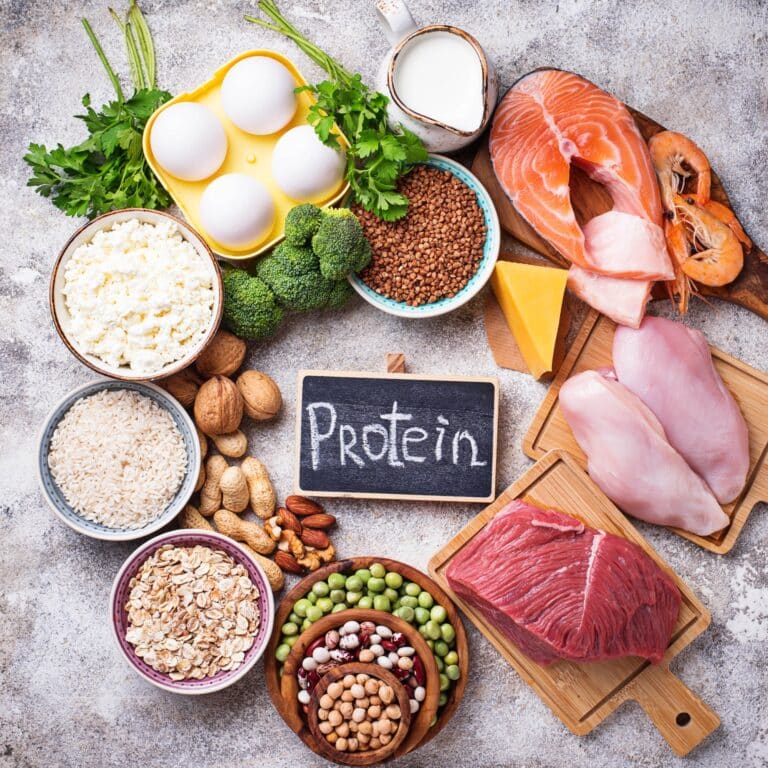
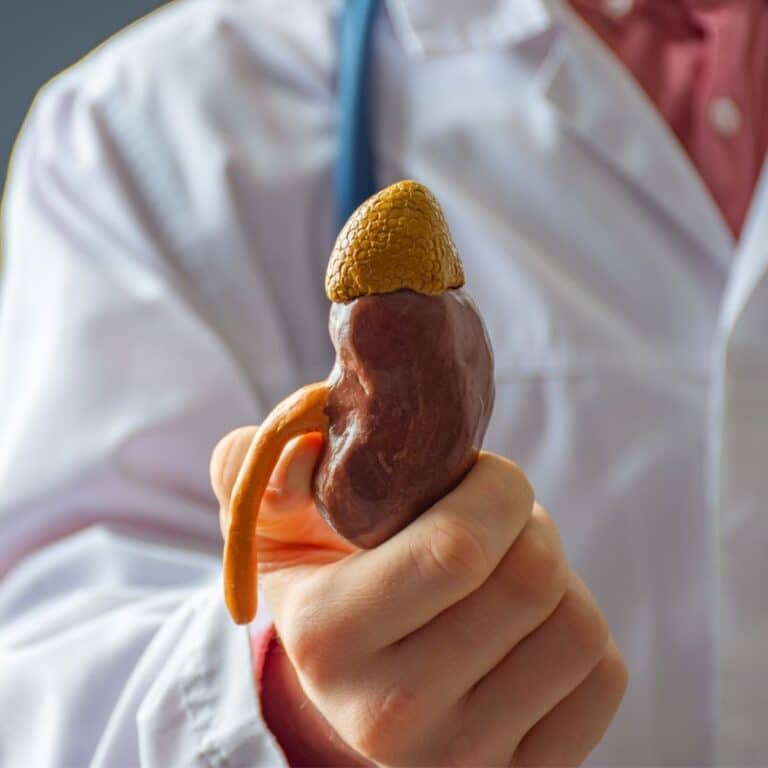

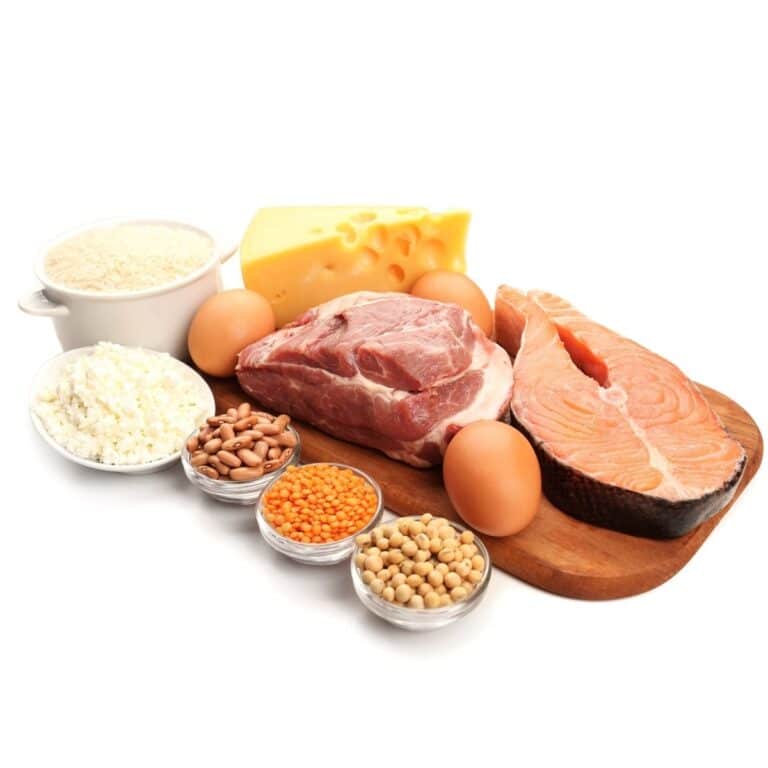





Thanks for your informative and helpful information.
would love to hear from anyone who has neither high blood pressure, nor diabetes , and has dipped below 60 for egfr counts - that have improved their egfr count thru diet/exercise. im generally healthy , athletic and no longer a ALC drinker (dont smoke either)
Thank you I needed to know these levels as I get very thirsty during our hot summers.(Australia)
Thanks. Very helpful
Can I still drink pineapple juice if I have crohns disease
Thanks for the great advice. It has helped me a lot
Very helpful information
Very very interesting and helpful information. So excited to start a serious change in my diet.
I am stage 4 CKD and being managed by a Nephrologist at Jefferson University Hospital in Philadelphia.
He has me strictly watching my potassium, salt and sugar intake along with actually everything you are advising here. He is very strict about my BP monitoring and is finally getting it back down to a controlled level. I’d say I have someone who is concerned enough to keep working with me and keep me pre dialysis a bit longer in my life.
Sincerely
Carol Fitch